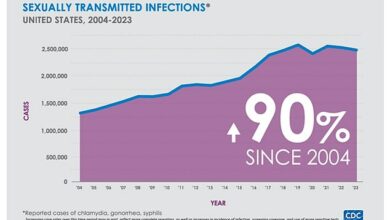Tampons contain LEAD and other toxic metals that can be absorbed by the body, alarming study finds



An alarming study revealed today that toxic metals may be in tampons sold in the UK.
Tests on 30 products purchased in New York, Athens and London found that some contained dangerous levels of arsenic, chromium and even lead.
And all 16 metals tested were found in at least one tampon.
Exposure to lead can impair brain development, while other metals can cause life-threatening blood clotting and increase the risk of certain cancers.
US researchers claimed the study showed that tampons are “a potential source of metal exposure” for women.

Tests on 30 products purchased in New York, Athens and London found that some contained arsenic, chromium and even lead. And all 16 metals tested were found in at least one tampon. Exposure to lead can hinder brain development, while other metals can cause blood clotting and even increase the risk of certain cancers.
However, experts urge women not to panic and warn that more research is needed to discover whether there is any danger to users.
Although some of the products are available in the US and others in the UK and EU, the researchers chose not to disclose the names of the products and the 14 brands.
Dr Jenni Shearston, an expert in air pollution epidemiology at the University of California, Berkeley, said: ‘Despite this high potential for public health risk, little research has been done to measure chemicals in tampons.
‘To our knowledge, this is the first paper to measure metals in tampons.
“What is concerning is that we found concentrations of all the metals we tested for, including toxic metals such as arsenic and lead.”
Professor Kathrin Schilling, assistant professor and geochemist at Columbia University, adds: ‘Although toxic metals are ubiquitous and we are consistently exposed to low concentrations, our study clearly shows that metals are also present in menstrual products and that women may be at greater risk of exposure when using these products.’
Potential exposure to heavy metals through tampons is a concern as the internal tissue of the vagina is thin and these substances can easily enter the body.
The findings also have a potentially far-reaching impact, with approximately 50 to 80 percent of menstruating women use tampons monthly — for several hours at a time.
The study tested 16 metals, including arsenic, barium, calcium, cadmium, cobalt, chromium, copper and iron.
Manganese, mercury, nickel, lead, selenium, strontium, vanadium and zinc were among the other substances.
Researchers identified samples of all 16 tampons tested.
Various metals were found in all samples, including arsenic, cadmium, chromium, lead and vanadium.
Of these substances, lead had the highest concentration, with an average total of 120 nanograms per gram (ng/g).
Cadmium was followed by 6.74 ng/g, with arsenic levels of 2.56 ng/g.
Writing in the diary, Environment Internationalresearchers said: ‘There is no safe exposure level for lead.
“Any amount of lead that leaks from a tampon and enters the bloodstream could contribute to negative health effects.”
They added that no brand or type of tampon had significantly lower levels of metals.
Organic tampons contain higher amounts of arsenic, but non-organic tampons contain higher amounts of lead.
According to the authors, there were several ways the metals could have gotten into the tampons.

It comes just weeks after US consumer watchdog group Mamavation and the Environmental Working Group also suggested that tampons could contain harmful perfluoroalkyl substances, or PFAS. They are dubbed “forever chemicals” because they can linger in the environment for hundreds of years and have been linked to everything from cancer and high cholesterol to infertility.
One of these was that the cotton plants used to make tampons could have absorbed metals from the soil and water, especially if there were contaminants nearby, for example a cotton field near a lead factory.
They can also be added during manufacturing processes as whitening agents, antibacterial agents or through cross-contamination from other manufacturing processes.
Dr Shearston said: ‘I really hope that manufacturers will be required to test their products for metals, especially toxic metals.
“It would be exciting if the public asked for this, or for better labeling on tampons and other menstrual products.”
However, experts urged women not to panic, warning that there is “no evidence the metals pass into menstrual blood”.
Professor Atholl Johnston, emeritus professor of clinical pharmacology at Queen Mary University of London, told MailOnline: ‘I don’t doubt the study findings, but I do doubt the bioavailability of the metals in the tampons.
‘Before being analyzed, the tampons were cut into pieces. The researchers then added 2 ml of 67-70 percent nitric acid (HNO3) to each sample. The tampons were then pre-digested overnight at room temperature, after which they were allowed to digest acid using a microwave.
‘Hardly an environment comparable to the average vagina.’
He added: ‘If I were a woman who used tampons, I wouldn’t be panicking right now.
‘There is no evidence that the metals enter the menstrual blood and are absorbed into the body.’
This comes just weeks after US consumer organisation Mamavation and the Environmental Working Group also suggested that tampons may contain harmful perfluoroalkyl substances, or PFAS.
They are called “forever chemicals” because they can last in the environment for hundreds of years. They have been linked to everything from cancer and high cholesterol to infertility.
Mamavation found that its popular Playtex tampons, Always panty liners, and Carefree panty liners, all sold in the US, tested positive for organic fluorine, a chemical that contains PFAS.
Playtex Sport contained 19 ppm of chemicals, while the Always liners contained 21 ppm and the Carefree product contained 17 ppm.
Last year, high silver content was also found in a number of period pants in British fashion stores.
Silver is used as an antimicrobial agent and is commonly added to menstrual underwear to combat odor and hygiene concerns.
However, scientists have discovered that nanosilver can kill lactobacillus, the healthy bacteria in the vagina that help fight infections.
This puts menstrual panty users at greater risk of harmful bacteria, which can lead to an increased risk of bacterial infections and complications during pregnancy.




